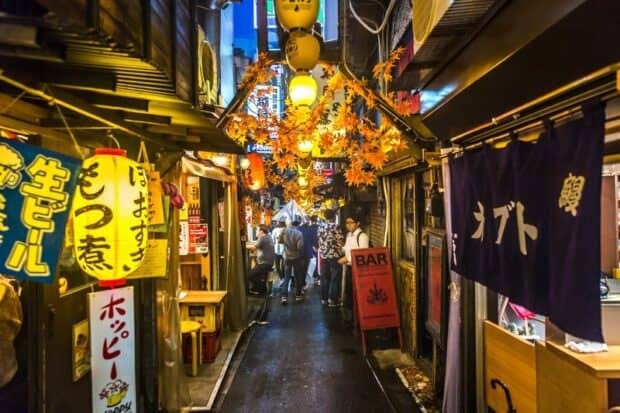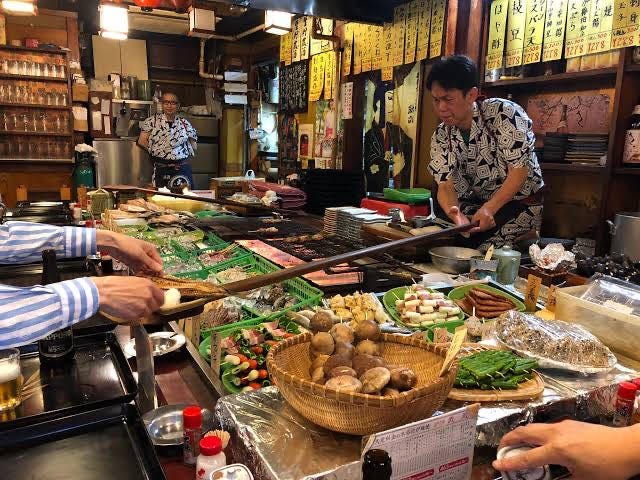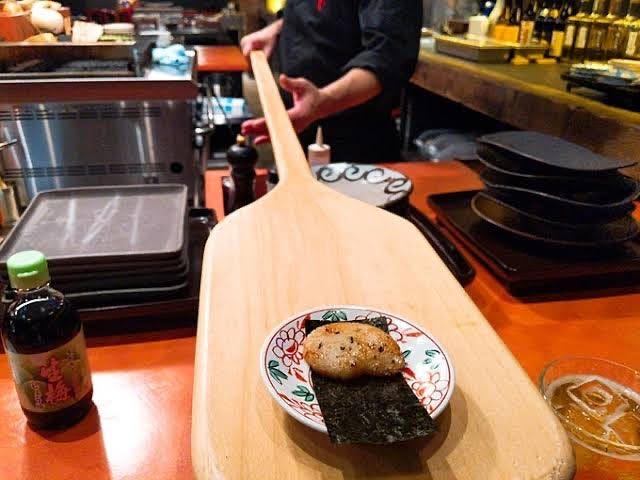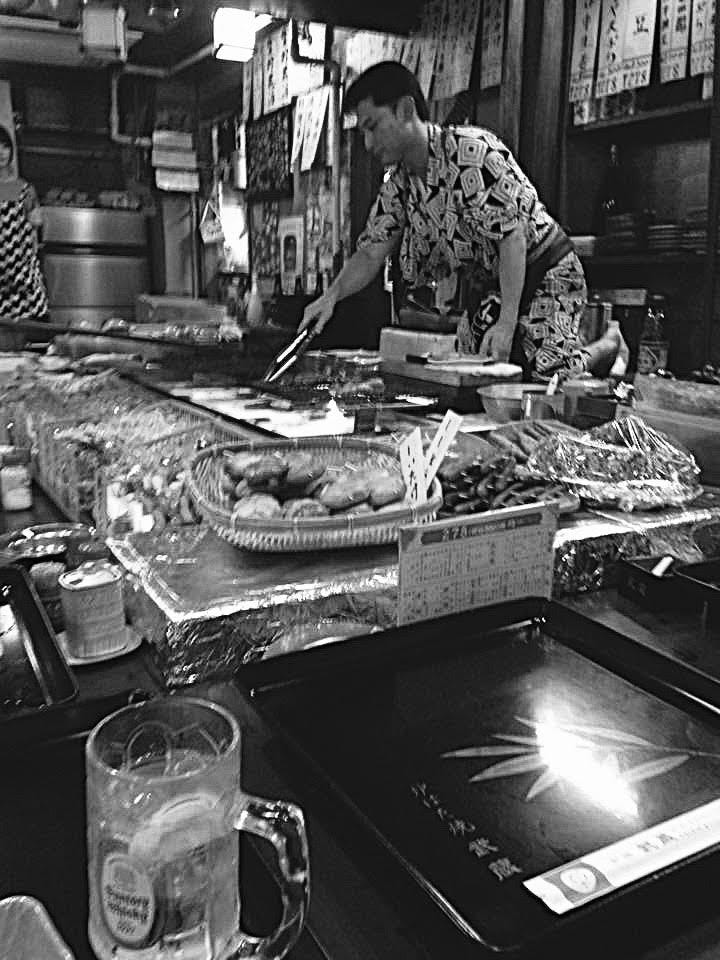In 1987 the backstreets around Shimbashi Station weren’t really streets. You couldn’t even call them alleys. The area was more of a warren with rabbit paths in a tangle.
In the daytime the area was deserted. But at night, it came alive with post-work salarypeople in search of food and drink.
The smoke. You couldn’t miss it. The warren was filled with thick, delicious-smelling plumes every weekday evening of the year. Mostly grilled fish and seafoods as well as of course pork, chicken breasts, and wings. Red and white illuminated lanterns hung outside most of the shops displaying either the name of the establishment or the types of food on offer.
Yakitori
Ramen
Niku!! 肉!!
Shimazaki’s Bar
It was a loud place. The shops themselves—doors closed or wide open for ventilation in warmer months—were nothing more than corrugated tin walls with plastic windows. Everyone yelled and many would sing whether they had a karaoke mic or not.
It was odd. Very few shops had chairs. Most customers sat on rusty stools with vinyl seat tops or on “seats” that were not much more than upside down plastic buckets.
It was a shantytown, yet the roads and the shop entrances and interiors were kept meticulously clean of dirt, trash, cans, bottles, and even cigarette butts. The salarymen customers traveled shop to shop in small packs. It took me a few years to learn that in those days night rovers weren’t just from the same company—they were often from the same long steel desk within that firm. Comradery and company pride was tight then. Brawls or even arguments were almost never seen or heard.
“Let’s go in here! I came here last Friday and had the pork—you won’t believe it!”
“Going home, Kawasaki? It’s only 9PM. Your wussiness is killing me.”
“Ah, the lovely Midori-chan. We’ll stop in later to say hi. I’ve got a bottle at her joint.”
On the west side of Shimbashi Station alone, the drinking and eating warren had over 500 establishments. Most held no more than 10 customer seats. It was not unusual to see bars with three seats. The warren was constructed of one-story buildings, all adjoined as if stapled or krazy glued together. Any larger pieces of property were subdivided to wedge in more tiny bars, eateries, and cafes. In the darker recesses of the warren, you could find small peep shows, porn shops, and individual “video booths,” all run by low-level gangsters.
I was 23 and working at my first Tokyo job. You know how immigrants arrive in a new country “fresh off the boat,” not speaking a word of the local language? Not knowing how to ride a bus? That was me. Useless.
Our team’s boss was Makimura kacho, which means Section Head. I don’t know his first name—I don’t think I ever asked. No one in a Japanese company calls anyone (except young gaijin) by anything other than their family names.
Makimura kacho was the leader of our six-person steel desk so he sometimes would suggest that the team go out in the evening for something to eat and drink. It was the eighties, money was growing on trees, so the company would pay for everything. My young teammates and I had nothing more back in our apartments than instant noodles, so the free night out was more than welcome.
“We’re going to Fujimori Robatayaki,” Makimura announced. We dutifully trotted behind him to Tamachi Station for a two-stop ride on the Yamanote Line into Shimbashi.
Among the team members, I was closest to Numayama-san, about my age I believe, and Sakai-san, an elder brother figure for the group. They filled me in on the plan as I hadn’t actually caught where we were going or why. Sakai-san said, “It’s dinner on the company, and I’m sure we will go to kacho’s favorite hostess bar after for karaoke and Scotch and Waters.” It all sounded light years better than the UFO noodles at home.
Makimura kacho asked if I knew what a robatayaki restaurant is. I shook my head. “You’ll like it, Jack-san. Very Japanese. The cook is on his knees in the middle of the restaurant.”
Numayama-san piped in, “There are no waiters. The food and drinks come to us on long…wooden…”
Numa didn’t know the word in English. Makimura kacho tried to finish for him. “Like the long wood stick thing you use in the water to move a boat!”
I had no clue what either of them were talking about.
At Shimbashi Station, we continued to trot behind Makimura kacho. He crossed a main road and led us into the warren. My eyes, ears, and nostrils were hit…delighted. Smoke swirled everywhere. By the end of this evening our clothes will all smell of chicken skin, charred fish heads, and pig grease I remember thinking.
He led us down several twisting rabbit paths. Left, left, right, left. Finally we stopped in front of Fujimori’s. It was howling with loud ordering, welcoming, thanking, and unintelligible customer yack. Makimura slid the plastic front door to the side, and a tiny bell jingled to announce our arrival.
Four staff yelled an “Irrrrrashaiiii” welcome. They didn’t even look up from their chaotic duties.
“Six? Okay?” our kacho asked. A young staff lady, dressed in happi coat, a sweat-soaked bandana, and stained shorts pushed and shifted some customers around, grabbed six floor cushions, tossed in a tiny table, and pointed to our newly created space. I noticed that all of the restaurant flooring was old, cigarette burned tatami mats. No chairs. Staff shuffled around in what looked to be socks.
In addition to small, often cold dishes of vegetables, fish cakes, and other nibbles, a robatayaki serves freshly grilled food. Typically one or two cooks set up their charcoal “kitchen” in the middle of the restaurant while the customers sit fully around them in something of a circle. The grills are either sunk down into the tatami floors, or just placed on the mats in the center of the room. Presumably there are exhaust fans sucking smoke out because cooking never stops.
Today’s roba generally hand you your food and drinks. Staff come to your table. A traditional roba like Fujimori’s uses shamoji, or paddles on very long poles. (I suddenly got Makimura’s weird boat references.) The kneeling cooks finish a dish, load it onto the paddle and, never moving from their crouch, extend the pole right across the room to the customer.
And yeah, things are tight. Sometimes a paddle needs to cross your table to reach another set of customers sitting nearby. You ignore the grilled fish and Sapporo beer silently traversing your food and continue your conversation.
Everything comes by paddle. Order three more sakes? A paddle suddenly is in your face or just to your right with three perfectly balanced tokkuri of hot or cold sake. Instinctively you look up the length of the 12-foot pole intruding on your meal and see the cook. Your eyes meet, he juts his chin out and smiles “Yours,” and you take the delivery. If you’re mid-conversation and happen to not notice the paddle off to your side, the cook yells, “HEYYYYY! THREE SAKE GUY!!!” Just in case you startle or maybe drunkenly gesture your arms mid-story, he’s ready to shift the paddle quickly to the side to dodge your clumsy mistake.
Experienced and well-mannered customers, after receiving their orders, help clear their tables of used dishware and glasses by re-loading them back onto the paddle so the central kitchen doesn’t need to send someone shuffling out to keep your space clear.
As Numa said, there is no table help. There aren’t even menus. All night long customers yell their orders to the cooks in the middle of the room, and the paddles remain in almost constant motion all evening long.
A check finally arrives by paddle, but as money is filthy, you absolutely don’t put bills and coins on the paddle. You get up and pay the lady at the door on your way out.
I loved that job with Makimura kacho and crew. I was paid dirt but hell I was 23.
I was of very debatable use to the company, yet they patiently taught me a career’s worth of local business behaviors and standards. Makimura kacho treated me just like any other 23-year-old, slowly chipping and molding and shaping a young salaryman that one day may deliver something back to the operation.
A year or two later I found myself alone with Makimura at his Shimbashi hostess bar in the same warren. The other teammates, all blotto, had gone home for the evening, and I stayed for a final round and maybe a few more songs.
There’s an unwritten rule in Japan that anything asked or said over drinks is forgotten in the morning. The evening is time for the team to reduce frustrations, or maybe to blurt out thoughts or observations there is no way in hell they’d ever say when sober. In speech and honest feedback reticent Japan, the system works well.
I asked Makimura kacho a question that was in the back of my mind.
“I know I’m useless today. But if I stay in this firm my whole life and decades later I become the most amazing asset this company has ever had—like I speak Japanese perfectly, clients love me, I build revenue like nobody’s business, I’m a leader among employees—could I ever sit on this company’s Board?”
“What?” Makimura asked.
“You know. If one day I’m the best of the best, could I be appointed to the Board?”
Makimura kacho laughed. “No,” he said. He started giggling into his Scotch and water at the question. I could see him imagining the ridiculous scene.
He patted my shoulder. “You’re not Japanese, Jack-san.” He laughed again.
He wasn’t being dismissive or hostile. It was just a wild-ass thought to him. Only Japanese could ever sit on a Japanese company’s Board. It’s just the way it is.
I nodded and thanked him for the answer. He asked me to sing Johnny B. Goode so I did.










I really love Jack Krown / Frog's Glen Japanese anecdotes. So well written and they remind me of my own two very happy years in Japan. In this one, I could smell the smoke of the cooking as I read.
Great experience! Robatta-yaki is one of my favorites, too. I hope that you proved your old boss wrong by making it to the board somewhere!